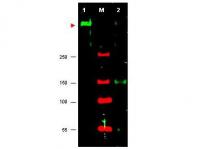ATR Rabbit Polyclonal Antibody
Other products for "ATR"
Specifications
| Product Data | |
| Applications | WB |
| Recommended Dilution | ELISA: 1:15,000 - 1:70,000, WB: 1:1,000 - 1:5,000 |
| Reactivities | Fish, Human, Monkey, Mouse, Rat, Xenopus, Dog |
| Host | Rabbit |
| Isotype | IgG |
| Clonality | Polyclonal |
| Immunogen | This affinity purified antibody was prepared from whole rabbit serum produced by repeated immunizations with a synthetic peptide corresponding to an internal region of human ATR protein. |
| Formulation | 0.02 M Potassium Phosphate, 0.15 M Sodium Chloride, pH 7.2 |
| Concentration | lot specific |
| Conjugation | Unconjugated |
| Storage | Store at -20°C as received. |
| Stability | Stable for 12 months from date of receipt. |
| Gene Name | ATR serine/threonine kinase |
| Database Link | |
| Synonyms | FCTCS; FRP1; MEC1; SCKL; SCKL1 |
| Note | Ataxia Telangiectasia Mutated (ATM) and Rad 3-related protein (ATR) is a phosphatidyl-inositol kinase (PK)-related kinase which functions in response to DNA damage and repair as well as at DNA replication checkpoints during the cell cycle. ATR activates checkpoint signaling upon genotoxic stresses, such as ionizing radiation (IR), ultraviolet light (UV), or DNA replication stalling, thereby acting as a DNA damage sensor. ATR is a member of the DNA-PK kinase family and is closely related to ATM and DNA-PK for which DNA stimulates the observed kinase activity. Chromosomal remodeling proteins have also been reported to associate with ATR complexes, including histone deacetylases (HDAC1, HDAC2 and CHD4). ATR is known to phosphorylate BRCA1, CHEK1, MCM2, RAD17, RPA2, SMC1 and TP53/p53 which collectively inhibit DNA replication and mitosis and promote DNA repair, recombination and apoptosis. ATR is a nuclear protein, but can also be found in PML nuclear bodies in certain cell types. ATR is recruited to chromatin during S-phase and redistributes to discrete nuclear foci upon DNA damage, hypoxia or replication fork stalling. |
| Reference Data | |
| Protein Families | Druggable Genome, Protein Kinase |
| Protein Pathways | Cell cycle, p53 signaling pathway |
Documents
| Product Manuals |
| FAQs |
{0} Product Review(s)
0 Product Review(s)
Submit review
Be the first one to submit a review
Product Citations
*Delivery time may vary from web posted schedule. Occasional delays may occur due to unforeseen
complexities in the preparation of your product. International customers may expect an additional 1-2 weeks
in shipping.






























































































































































































































































 Germany
Germany
 Japan
Japan
 United Kingdom
United Kingdom
 China
China



